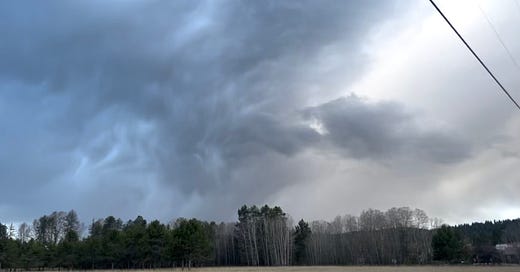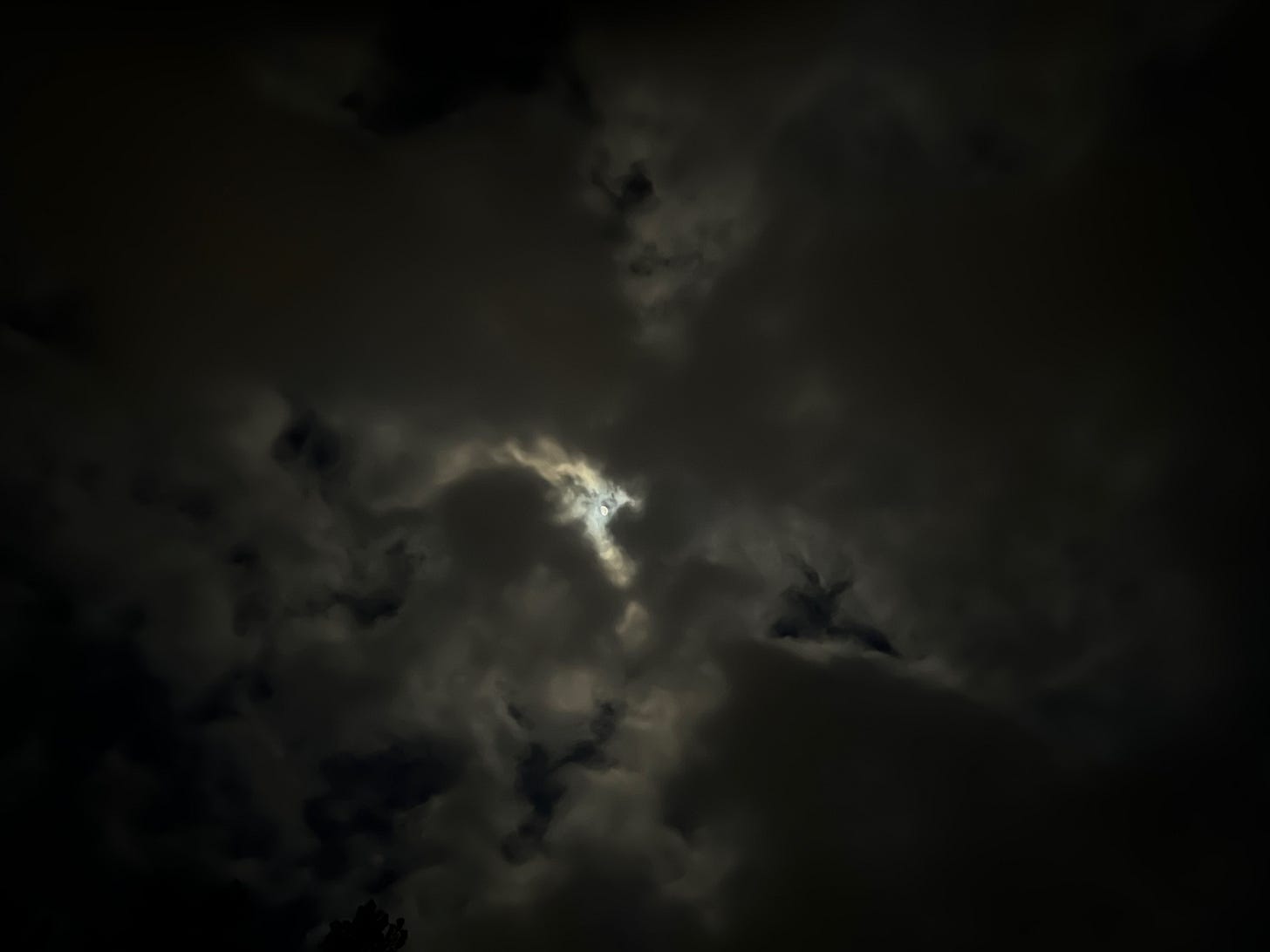Welcome! For those new here, On the Commons explores the deep roots and ongoing consequences of private property and commodification—from the Doctrine of Discovery to ancient enclosures of the commons, and more—along with love for this world and being human in the middle of systems that often make such “being” difficult.
I include an audio version of all posts, but it’s not an exact match because I chitchat a bit.
5% of this quarter’s On the Commons revenue will be given to the Flathead Warming Center.
If you’d spent most of your life under skies like this, might gray be your favorite color, too?
Audio version:
In a week or two, a few yards of compost will get dumped on the edge of my garden. This is arguably one of the events I look forward to most all year. The ground is still too cold to work in it much—it snowed again yesterday and nights are back below freezing. (I accidentally typed “freezling” there and I like it so much better. Freezling has delightful possibilities.) At this point in the year, the garden’s emerging green prompts only eager possibility, before the pressure of weeding quack grass and thistles gets to me, before we head into when my year truly starts, the hot days of August when I’m strategizing huckleberry-picking days and tomato-canning sessions and keeping an eye on when the chokecherries are ripe.
Compost delivery speaks of warm mornings watching tree swallows in the nesting box while I pick strawberries and snack on peas, talk with sweetgrass, which I checked on as soon as the snow mostly melted, and was taken aback by how many new plants are peeking up. Some of them are undoubtedly quack grass, but there are plenty of telltale red-tinged tips. I cannot wait to smell her in the warmth of June, gently coax her strands into braids.
Our local compost service is one of the best understated things about where I live. Every week my five-gallon bucket gets picked up, more or less full of cucumber ends, pizza crusts, moldy cheese, steak bones, coffee grounds, overripe avocados. It gets taken to bear-proofed land not far from here and joins similar bucketsfull from households all over the valley, along with larger bins from local restaurants, to heat up to the point when a variety of bacteria begin to break all of it down and turn it into dirt, helped by viruses, fungi, and of course worms, slugs, nematodes, and all the other tiny creatures less immediately attractive than, say, apex predators, but no less vital to keeping a living planet alive.
Every year, when those yards of compost slide out of a truck in my garden, I get a little thrill thinking of how contained it all feels, how efficient, to see consumption turned back into something fertile and full of life instead of tied up in a plastic bag and added to the mountainous landfill just outside of town. That growing mountain of trash, and the fact that when I was a teenager thirty years ago the landfill was not a mountain, but a pit in the same location, makes me want to try harder to live close to home, to take more responsibility for this place I love so much and all those who depend on its vitality. To eat more huckleberries and spruce tips gathered from the surrounding mountains and far fewer avocados shipped thousands of miles from places whose dire water situations I’m too well aware of to pretend ignorance.
Putting my hands in compost prods me to make fewer choices that make other communities’ lives harder, but what I like about it is that it does so by reminding me how much joy there is to be found in loving and taking responsibility for the life I live among.
There’s something I learned years ago that often haunts me in the hours of darkness when sleep is elusive: when the Three Gorges Dam in China was completed, controlling the flood cycle of the Yangtze River, it altered Earth’s rotation enough to add 0.06 milliseconds of daylight hours to the planet.
I read something similar, though not as drastic, about depletion of the aquifer under California’s agricultural region, one of the things that contributed to my mostly giving up almonds.
You only have to read a handful of scientific papers to start seeing how vast the planet-wide relocation of water is, from ubiquitous and often unnecessary dams, to water-intensive alfalfa grown in Arizona to feed cows in arid Saudi Arabia, to the thirsty avocados grown in Chile or Mexico that end up in my compost bin.
Trade and exchange have been around essentially forever. How much is too much, though? How far is too far? How do the critical quantities of phosphate mined in the Western Sahara and sent to fertilize farms all over the world compare with peat moss harvested fifty miles from me and used to feed gardens like mine? What keeps my sleepless hours company isn’t some nightmare scenario where humans screw things up enough to throw the planet completely off her orbit; it’s more of a philosophical question. One at the core of most of what I write: how do we live together? Not just humans, but all of life.
If there’s a balance, it’s one that shifts constantly over time but one thing I think is certain: if that balance is to be in service of life, it must be determined by kinship and care, not by what one region wants that another happens to have. It must be determined by a deep sense of right relationship, not by who has the power to take and who lacks the power to say no.
It’s hard to undo built-in consumption practices, much less to escape the systems that enable them. The meat my family eats is almost all local and a lot of it is wild, brought home through my own efforts and the generous gifts of the land I try to live with. But the bags of lemons I bring home from Costco aren’t. I grow the strawberries we eat, but not the frozen blueberries in winter. Knowing too much about the environmental and social costs of the floral industry, I rarely buy cut flowers for people, but I still use coconut oil for my homemade lotion.
All of these end up in my compost in one form or another. I like that I can think of food eaten in my home cycling into dirt and transforming into food again, but as much as it helps decrease the growth of that landfill outside of town, how much weight has it also shifted from other places on this planet I might never see but that are beloved by those who live among them? How much of the soil I use to grow strawberries and potatoes carries with it the gravity of others’ hardships?
The compost will be delivered, and I’ll ask the driver about her now-toddler while we rake it out of the truck, and she’ll leave and I’ll stand in my muck boots and stare at the pile and think of what will grow from it. I’ll wish, as I do every year, that a strong friend or two would come by and help me shovel it all onto the garden beds in time to get the potatoes in.
That would be a gathering, wouldn’t it? Skip all the writerly readings and presentations and workshops and you all could come over and help get the garden started or just hang out watching flickers and tree swallows, and I’d cook big pots of things for every variation of eater and we’d lay wood in the fire pit and sit around muscle-weary and well-fed, and drink water from the aquifer my well draws from, and tell stories while the sky slowly melts to dark and the stars come out and the air turns freezling and Moon comes out to join the party.
A gathering like that would be something like compost, where there are no hierarchies or leaders, no unnecessary suffering, no waste, and everyone has a part to play, a contribution to make, simply by existing. We could create our own human ground where the potential still remains for so much to grow.
Building Local Power had a nice overview last year of small compost businesses and the barriers they face—from land access to funding—as well as their benefits.
Evening Moon below, and a little morning birdsong:






If I could, I would gladly come over to shovel the compost in your garden bed Nia in turn for time together eating huckleberries and watching kitchen waste turn into dirt. And we could dream to help, even if in minuscule degrees, to keep the Earth from falling off its axis. 💜
Oh you know I’d be there!
Loved listening to this as the city truck pulled up and dumped a pile of mulch on my driveway. I’ll have my own spreading party with my spouse and kids this weekend 😆 Sam also ordered topsoil and I have no idea where he plans to put it! Lol. So I may be reaching out to neighbors to see if we can share. I also heard the chickadee and a pair of ducks added their calls while I was listening to your recording too. Love listening. Thanks for sharing 🩷🩷